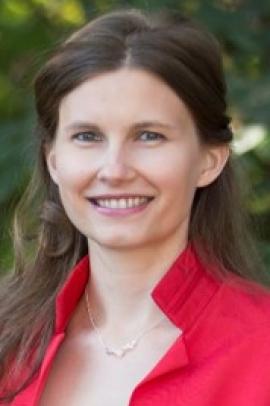Elyssa Ford is an associate professor of history at Northwest Missouri State University, and her research centers on memory and identity, women's history, and public history education. Ford's first book Rodeo as Refuge, Rodeo as Rebellion examined gender, race, and identity in rodeo and her second book project is on gay rodeo. She has published on Midwestern and Missouri history topics for the Missouri Historical Review and National Park Service. Her work on public history pedagogy examines academic-community partnerships, the value of local history for student engagement, and the potential and problems that rural museums face.
Email: ebford@nwmissouri.edu
-
Available Presentations (h3 text)
Available Presentations
Soothing the "Savage Hearts of Man": Women's Suffrage and Rural Missouri
Though often ignored by the national and eastern organizations, women’s suffrage groups in the Midwest learned by the late 19th century that rural areas also must be targeted to win the hearts and minds of the electorate. Historian Elyssa Ford will focus on how rural women in Missouri played an important role in the suffrage movement. From Kirksville in the far northeast to Maryville in the far northwest, rural communities engaged in suffrage discussions, invited national speakers who bewitched–and sometimes enraged–local audiences, and supported their own suffrage workers. Within this world of Missouri suffragists, Ford will highlight the compelling story of Maryville’s Alma Nash and her all-women band who traveled to Washington, D.C., for the national women’s suffrage parade in 1913. Through their actions at the parade and at home in the Midwest, it is possible to see how a small group of young, rural women engaged with the suffrage movement and how they were shaped not just by the national suffrage discussion but by the local and often heated suffrage debates within their community.
Rural Nuns and a “Fine Herd of Cattle” at a Missouri Convent
In the Midwest, nuns at rural convents turned to God for spiritual guidance but had to rely on themselves to survive. The reality of rural geographies and the ecclesiastical dictates from the Catholic Church created a complex set of limitations and surprising opportunities for some of these religious communities. In this talk, historian Elyssa Ford will discuss a convent in northwestern Missouri where the Benedictine Sisters of Perpetual Adoration have lived since the 1870s. The convent operated similarly to other rural religious establishments with the women running an orphanage and several schools, along with a dairy and farm to provide sustenance for their own use and that of their students and orphanage residents. Yet in the 1920s and 30s the convent ended their teaching eorts and turned to a more unusual source of income – a dairy herd and cattle breeding enterprise. By the 1940s these cattle were renowned across the state and stud bulls sold to international buyers. This talk will examine the unusual role of religious women in work like this, the public perception of their work, and the dairy industry’s reaction to them when they made the abrupt decision to sell their cattle herd in 1963.
Program Underwriting
-
Program Underwriting
Each speaker can provide up to four presentations to underserved rural communities at no cost to the hosting institution. For the presentation to be covered by program underwriting, the host organization must be nonprofit and located outside Boone, Greene, Jackson, and St. Louis counties and outside the city of St. Louis.
For presentations that qualify for program underwriting, there is no cost to the host organization. The number of underwritten presentations this speaker has remaining is indicated below.
Requesting a Speaker
-
Requesting a Speaker
Contact the speaker directly to make arrangements.

